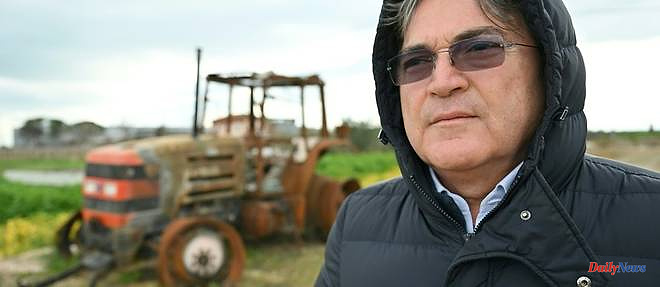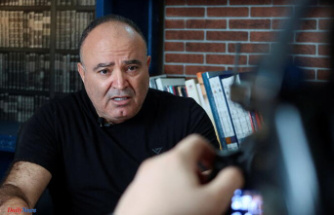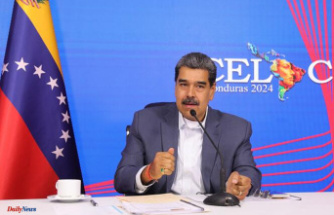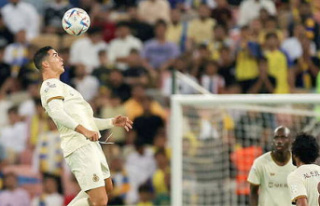It took a loaded gun pointed at the head of Lazzaro D'Auria for this farmer from Puglia, southern Italy, to finally give in to the demands of the mafia.
He had resisted several extortion attempts in the past, refusals that had resulted in threats and damage to his properties and crops, but this is a visit at dawn of a dozen men in his tomato fields, including an armed chief, who finally convinced him to agree to pay them 150,000 euros per year.
The next day, instead of complying and paying, he went to the police, becoming one of the few victims to file a complaint against the Mafia of the city of Foggia, a criminal organization that had remained in the shadows for a long time but which is currently the most violent on the peninsula.
"If more locals get involved, the local mafia could be weakened. For 40 years, the Foggia mafia has gone about its business undisturbed, but in the last six to seven years it has suffered setbacks," he said. AFP Lazzaro D'Auria, who has been living under police protection since 2017.
"People of Foggia, file a complaint!" implores the 57-year-old entrepreneur, who sees the recent crackdowns by the police as a sign that the mafia can be fought if residents can overcome their fears.
Long underestimated and considered a backward rural phenomenon confined to bloody clan disputes, this "fourth mafia" - the other three being the Cosa Nostra in Sicily, the 'Ndrangheta in Calabria and the Camorra of Naples - was finally taken seriously by the authorities.
The youngest of the Italian mafias had already put the great province of Foggia under control: drug trafficking, armed robberies, car thefts and extortion.
"It's a rudimentary, primitive mafia. Very violent, very aggressive", analyzes Ludovico Vaccaro, prosecutor of Foggia.
While the main mafias have moved from violent modes of action to less visible and more profitable activities, including within the legal economy, the Foggia mafia is still in its first phase.
"Today, the mafias have evolved, they fire less shots, they seek a more discreet strategy not to be noticed," observes Mr. Vaccaro. "While this mafia shoots and kills to assert its hold on its territory".
The name "Mafia of Foggia" is a catch-all formula bringing together different groups involved in several criminal sectors.
The province of Foggia, which stretches from the Gargano promontory overlooking the Adriatic to the agricultural plains of the interior, ranks third in the homicide rate, with five of the 16 murders committed last year are linked to the mafia.
"Battalions" formed on the basis of family ties, each controlling a geographical area, often cooperate with each other and share the proceeds of their extortion to pay their members and support those among them who are in prison.
"When conflicts arise over the sharing of these illicit profits (...) the battalions clash and kill each other", explains a Foggia police official, Mario Grassia.
Each group has its specialty, from armed robbery of cargo trucks in the Cerignola area to bombings of storefronts or vehicles to persuade their hesitant owners to checkout in the town of Foggia.
In the San Severo area, farmers like Mr. D'Auria often find their olive trees cut down, their crops burned or their livestock stolen.
On the coasts of Gargano, where both tourists and drug shipments from Albania land, the mafia is particularly violent.
Four years ago, a human skull was left in front of a municipal building to send a message to the mayor of Monte Sant'Angelo. The head of a goat pierced with a dagger was addressed the same year to the lawyer for the mother of a missing mob victim.
According to investigators, the mafia in Gargano is known to fire shots in the face of its victims, but also to abandon the corpses in underground caves.
During a patrol with the Foggia police, AFP was able to see the traces of multiple bloody crimes that had terrorized the population over the years.
From the place where construction entrepreneur Giovanni Panunzio was shot to death in 1992 for being the first to publicly denounce the Mafia, to the abandoned farmhouse where police foiled an attack on a businessman in 2022 , or the cafe whose owner was killed in 2020 when he was stabbed in the eye in a burglary in 2020. But there are plenty of other places like that.
“Currently, there is no mafia war, but settling of accounts,” notes a police officer on condition of anonymity.
In November, 21-year-old Nicola Di Rienzo was shot five times in a public park. His 17-year-old killer surrendered to the police a few hours later, but in the meantime "nobody spoke, nobody saw anything, nobody heard anything", he said.
Police chief Mario Grassia is particularly concerned that three murders in 2022 were committed by minors, in a context of growing juvenile delinquency.
"Those who are part of these teenage gangs have family ties with people linked to organized crime," he observes.
Another subject of concern: the infiltration of the mafia in public institutions. The city council of Foggia was dissolved in 2021 for mafia infiltration and its mayor was arrested for corruption. Four other municipal councils in the province have been dissolved since 2015.
In recent years, several bosses have been incarcerated as part of the authorities' attempts to regain control of the territory from the mafia, but there is still a lot of work to be done.
Interior Minister Matteo Piantedosi went to Foggia in February to reassure the population, promising to strengthen security, in particular through the installation of remote surveillance cameras.
But according to the prosecution, more police, judges and courts are also needed to fight against "the climate of fear and intimidation and socio-cultural poverty".
The province has only one court, where 12,000 criminal cases are awaiting trial. "In this vast territory, either the state controls the situation, or it is the criminals who will do it," warns Mr. Vaccaro.
Last summer, Mr. D'Auria's grain fields went up in flames, as did three of his tractors. Worse still, according to him, his bank has cut his credit lines in half because he is considered a "high risk" customer.
However, he wants to see glimmers of hope in the recent arrests and convictions showing that the state is finally mobilizing against this mafia. "I feel much safer than before, but the fear is still there," he says.
17/03/2023 08:42:12 - Foggia (Italy) (AFP) - © 2023 AFP












